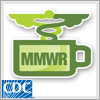A CUP OF HEALTH WITH CDC
Fill Up with Folic Acid
Grand Rounds: Additional Opportunities to Prevent Neural Tube Defects
with Folic Acid Fortification
Recorded: August 31 2010; posted: September 2, 2010
[Announcer] This podcast is presented by the Centers for Disease Control and Prevention. CDC — safer, healthier people.
[Dr. Gaynes] Welcome to A Cup of Health with CDC, a weekly feature of the MMWR, the Morbidity and Mortality Weekly Report. I’m your host, Dr. Robert Gaynes.
Neural tube defects are serious birth defects that affect the development of the brain or spine. These conditions can result in a lifetime of health problems or even death. One of the leading causes of neural tube defects is a lack of folic acid before and during the first few weeks of pregnancy.
Alina Flores is a health education specialist with CDC’s National Center for Birth Defects and Developmental Disabilities. She’s joining us today to discuss the importance of folic acid in preventing these birth defects. Welcome to the show, Alina.
[Ms. Flores] Thank you. It’s nice to be here.
[Dr. Gaynes] Alina, what are neural tube defects and what health problems are related to them?
[Ms. Flores] Well, the neural tube is what eventually will form the baby’s brain and spine. When the brain doesn’t form correctly, this is called anencephaly, and when the spine doesn’t form correctly, this is called spina bifida.
Pregnancies affected by anencephaly are generally miscarried or if the baby is born, the baby will die shortly after birth. As far as spina bifida, babies born with spina bifida can lead long and very successful lives, but they do have a lot of health complications that they need to deal with throughout their lives.
[Dr. Gaynes] How common are neural tube defects in newborns and are there differences in the frequencies in certain populations in the United States?
[Ms. Flores] In the United States, we know that there’s 3,000 pregnancies affected by a neural tube defect every year. Although neural tube defects can affect any woman’s pregnancy, we do know that Hispanic women in the U.S. have higher rates of pregnancies affected by neural tube defects.
[Dr. Gaynes] Alina, what is folic acid’s role in preventing neural tube defects?
[Ms. Flores] Well, folic acid is a B vitamin that helps the neural tube develop properly. The neural tube closes by the third week of pregnancy which is most often before most women know that they are even pregnant. So what we really try and do is educate women about the importance of getting enough folic acid before pregnancy and then making sure that they get it during the first few weeks of pregnancy.
[Dr. Gaynes] How much folic acid should a person consume each day?
[Ms. Flores] The recommendation for anyone who can become pregnant is to take 400 micrograms per day.
[Dr. Gaynes] What are some ways for people to get their daily folic acid requirements?
[Ms. Flores] Well, there are three main ways. First, by taking a vitamin containing folic acid. Women can go to the store and look at the bottle of vitamins and read the label; make sure it says 400 micrograms of folic acid. The second way is by eating fortified foods. These are foods to which folic acid has been added. For example, breakfast cereals, breads, rice, pasta. Again, it’s important to read the label to make sure it says 400 micrograms of folic acid. Finally, women can eat foods high in folate which is a natural form of folic acid. Although this is an option, it’s really hard to get all the folic acid a woman needs through diet alone.
[Dr. Gaynes] Where can listeners get more information about folic acid?
[Ms. Flores] Listeners can go to our CDC website:
www.cdc.gov/folic acid, and ‘folicacid’ is just one word together.
[Dr. Gaynes] Thanks Alina. I’ve been talking today with CDC’s Alina Flores about the importance of folic acid consumption in preventing neural tube defects.
Remember, the most effective way to get enough is by taking a vitamin containing folic acid or eating fortified foods, such as breakfast cereals, bread, rice, and pasta. Because half of pregnancies in the U.S. are unplanned, if you can get pregnant, make sure you get 400 micrograms of folic acid every day.
Until next time, be well. This is Dr. Robert Gaynes for A Cup of Health with CDC.
[Announcer] For the most accurate health information, visit www.cdc.gov or call 1-800-CDC-INFO, 24/7.



